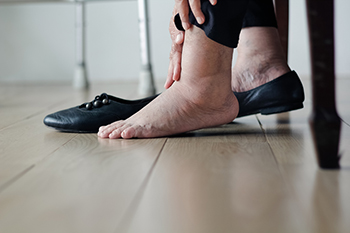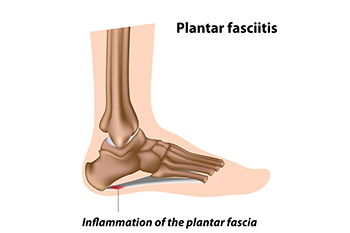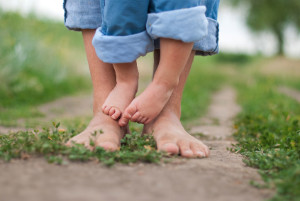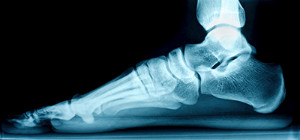Connect With Us
Blog
Items filtered by date: February 2023
Medications May Cause Swollen Feet

Swollen feet are common among older people. They can happen as a result of poor circulation, low protein levels, or leaky blood vessels. Approximately 70 percent of seniors are affected by chronic venous insufficiency (CVI), and the affected veins rely on valves that keep the blood flowing backward. The valves may become less efficient as the aging process occurs, and the blood may remain in the veins longer than it should. Edema, or water retention, may happen as a result of this, and it can affect the feet and ankles. Heart failure may be another reason why the feet may become swollen. Prompt medical attention is often sought if this condition becomes chronic. There are certain medications that may worsen swollen feet. These can include beta blockers, hormonal medicines, and over-the-counter painkillers. If your feet are swollen, it is suggested that you consult with a podiatrist who can determine the cause and offer treatment methods that are correct for you.
Swollen feet can be a sign of an underlying condition. If you have any concerns, contact one of our podiatrists of Bangor Podiatry. Our doctors can provide the care you need to keep you pain-free and on your feet.
Swollen feet are a common ailment among pregnant women and people who stand or sit for extended periods. Aging may increase the possibility of swollen feet and patients who are obese often notice when their feet are swelling too. There may be medical reasons why swollen feet occur:
- Phlebitis - A condition that causes the veins to become inflamed and can also cause leg pain.
- Liver disease - This may lead to low blood levels of albumin which is a protein. This can cause fluid in the blood to pass into the tissues and several areas of the body can become swollen.
- Heart failure - When the heart doesn’t pump properly the blood that is normally pumped back to the heart can pool in the veins of the legs causing swollen feet.
- Kidney disease - One of the main functions of the kidneys is releasing excess fluid in the body. This type of condition can make it difficult for the kidneys to function properly, and as a result the feet may become swollen.
- Deep-vein thrombosis (DVT)- This is a serious condition where blood clots form in the veins of the legs. They can block the return of blood from the legs to the heart which may cause the feet to swell. It is important to be treated by a podiatrist if this condition is present.
Swollen feet can also be caused by bone and tendon conditions, including fractures, arthritis, and tendinitis. Additionally, there may be skin and toenail conditions and an infection may cause the feet to swell. Patients who take medicine to treat high blood pressure may be prone to getting swollen feet.
Many patients elevate their feet to help relieve the swelling and this is generally a temporary remedy. When a podiatrist is consulted the reason behind the swelling can be uncovered and subsequently treated.
If you have any questions please contact our offices located in Bangor, Gilbert, and Bethlehem, PA . We offer the newest diagnostic and treatment technologies for all your foot and ankle needs.
Causes and Prevention of Plantar Fasciitis

One of the most annoying injuries experienced by runners is plantar fasciitis. This condition is said to be an overuse injury that causes the tearing of a band of tissue in the sole that connects the toes to the heel. When this tissue, termed plantar fascia, is irritated, it becomes inflamed. This develops into pain most commonly felt in the heel and under the arch. Unfortunately, the pain felt from plantar fasciitis is typically worse early in the day and calms down while running. As a result, runners might ignore it, increasing the problem over time. This contributes to further damage to the plantar fascia. Instead, taking measures to relieve the condition is recommended. Icing the heel can help, and ceasing the activity that caused the problem is paramount to helping the fascia to heal. Certain exercises can be performed to reduce the symptoms while also allowing time for the tissue to heal. For information and direction on ways to treat plantar fasciitis, it is suggested you consult a podiatrist.
Plantar fasciitis can be very painful and inconvenient. If you are experiencing heel pain or symptoms of plantar fasciitis, contact one of our podiatrists from Bangor Podiatry. Our doctors can provide the care you need to keep you pain-free and on your feet.
What Is Plantar Fasciitis?
Plantar fasciitis is the inflammation of the thick band of tissue that runs along the bottom of your foot, known as the plantar fascia, and causes mild to severe heel pain.
What Causes Plantar Fasciitis?
- Excessive running
- Non-supportive shoes
- Overpronation
- Repeated stretching and tearing of the plantar fascia
How Can It Be Treated?
- Conservative measures – anti-inflammatories, ice packs, stretching exercises, physical therapy, orthotic devices
- Shockwave therapy – sound waves are sent to the affected area to facilitate healing and are usually used for chronic cases of plantar fasciitis
- Surgery – usually only used as a last resort when all else fails. The plantar fascia can be surgically detached from the heel
While very treatable, plantar fasciitis is definitely not something that should be ignored. Especially in severe cases, speaking to your doctor right away is highly recommended to avoid complications and severe heel pain. Your podiatrist can work with you to provide the appropriate treatment options tailored to your condition.
If you have any questions please feel free to contact our offices located in Bangor, Gilbert, and Bethlehem, PA . We offer the newest diagnostic and treatment technologies for all your foot and ankle needs.
Babies' Feet Grow Fast

The feet contain one-quarter of the bones in the body, and will gradually develop from cartilage into bones. A baby’s feet may feel like a spongy material, and the arches will eventually form as their development progresses. A baby’s foot will grow three sizes during the first year of life, and it is beneficial that the feet are not restricted. When the crawling stage begins, it is helpful if the baby does this while barefooted, and this can help toes to become stronger as they try to stand up. Many parents choose to refrain from having their children wear shoes while indoors, which may help to strengthen the toes as they grip the floor. When it is time to walk outside, the first pair of shoes may consist of materials that are strong but flexible, and it is important they fit correctly. The baby’s growth will happen rapidly, and changing the shoes every few months will help to accommodate their growing feet. If you would like additional information about children’s foot health, please schedule an appointment with a podiatrist.
Making sure that your children maintain good foot health is very important as they grow. If you have any questions, contact one of our podiatrists of Bangor Podiatry. Our doctors can provide the care you need to keep you pain-free and on your feet.
Keeping Children's Feet Healthy
Having healthy feet during childhood can help prevent medical problems later in life, namely in the back and legs. As children grow, their feet require different types of care. Here are some things to consider...
Although babies do not walk yet, it is still very important to take care of their feet.
Avoid putting tight shoes or socks on his or her feet.
Allow the baby to stretch and kick his or her feet to feel comfortable.
As a toddler, kids are now on the move and begin to develop differently. At this age, toddlers are getting a feel for walking, so don’t be alarmed if your toddler is unsteady or ‘walks funny’.
As your child gets older, it is important to teach them how to take care of their feet.
Show them proper hygiene to prevent infections such as fungus.
Be watchful for any pain or injury.
Have all injuries checked by a doctor as soon as possible.
Comfortable, protective shoes should always be worn, especially at play.
If you have any questions please feel free to contact our offices located in Bangor, Gilbert, and Bethlehem, PA . We offer the newest diagnostic and treatment technologies for all your foot and ankle needs.
Two Types of Flat Feet

People who have flat feet are missing an arch. Most babies are born with flat feet, and the arch generally develops in the teenage years. In cases where this doesn’t happen, the reasons can vary from having an abnormal foot structure to having weak muscles in the feet. This condition is easily noticed while standing on the foot and observing there is little or no arch. Some patients have no symptoms of having flat feet, while other patients may find their feet become achy at the end of the day. Flat feet are grouped into two categories consisting of rigid or flexible. The arch is visible while sitting down in people who have flexible flat feet, and there is no arch at all with rigid flat feet. Children who have flat feet are urged to wear supportive shoes. If you or your child has this condition, please consult a podiatrist who can help you to choose the correct shoes to wear.
Flatfoot is a condition many people suffer from. If you have flat feet, contact one of our podiatrists from Bangor Podiatry. Our doctors will treat your foot and ankle needs.
What Are Flat Feet?
Flatfoot is a condition in which the arch of the foot is depressed and the sole of the foot is almost completely in contact with the ground. About 20-30% of the population generally has flat feet because their arches never formed during growth.
Conditions & Problems:
Having flat feet makes it difficult to run or walk because of the stress placed on the ankles.
Alignment – The general alignment of your legs can be disrupted, because the ankles move inward which can cause major discomfort.
Knees – If you have complications with your knees, flat feet can be a contributor to arthritis in that area.
Symptoms
- Pain around the heel or arch area
- Trouble standing on the tip toe
- Swelling around the inside of the ankle
- Flat look to one or both feet
- Having your shoes feel uneven when worn
Treatment
If you are experiencing pain and stress on the foot you may weaken the posterior tibial tendon, which runs around the inside of the ankle.
If you have any questions, please feel free to contact our offices located in Bangor, Gilbert, and Bethlehem, PA . We offer the newest diagnostic and treatment technologies for all your foot care needs.
Blog Archives
- August 2025
- July 2025
- June 2025
- May 2025
- April 2025
- March 2025
- February 2025
- January 2025
- December 2024
- November 2024
- October 2024
- September 2024
- August 2024
- July 2024
- June 2024
- May 2024
- April 2024
- March 2024
- February 2024
- January 2024
- December 2023
- November 2023
- October 2023
- September 2023
- August 2023
- July 2023
- June 2023
- May 2023
- April 2023
- March 2023
- February 2023
- January 2023
